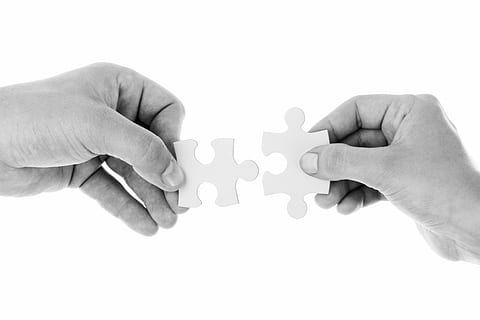OCD
Why the Anxiety? Befriend Your OCD and Get Back to Yourself
A Personal Perspective: OCD Is the messenger, not the enemy.
Posted May 31, 2023 Reviewed by Lybi Ma

OCD catches us by setting up a problem and throwing us off the trail. It’s like 15 minutes into a Law and Order episode when you think you’ve got the case solved, but it’s really just a dead end.
OCD doubles, triples, and quintillions down, having us pursue the wrong lead over and over because there’s hope beyond hope that it will finally yield its secret. But OCD almost always frames the wrong guy.
The toothache really wasn’t my problem, as you’ll discover below. Instead, there were feelings in my heart that were the real culprit whom I needed to befriend. As you read, notice if you too, have had situations where OCD tried to lead you off the trail.
About a month or two into the COVID-19 lockdown, I woke up one morning with a haunting obsession. I could feel a toothache just beginning, and my mind was already out in front: What if I need to go to the dentist and they are closed? What if I’m forced to suffer with this pain for days, weeks, or—gasp—months on end? What if I luck out with an appointment, catch COVID, and spread it to my entire family?
The more my mind spiraled, the more real my toothache became. I could feel the tell-tale signs of a cavity brewing: a relentless headache, the tension in my jaw, and a woozy feeling of vertigo. Spoiler: I didn’t have a cavity or need a root canal in the end.
It wasn’t an unreasonable or outlandish concern. Living just north of New York City, we were close to the epicenter of the COVID outbreak, and on the news, numbers were climbing every day. We saw stories about perfectly healthy adults in their prime—like Broadway star Nick Cordero–felled by this as-yet-unknown invader.
In the past, the obsessional spiral would have totally taken me in. I’d investigate every possible doubt and fear until I was so far down the rabbit hole I wouldn’t know up from down. But with a new understanding of OCD, I remembered to stop, go a little deeper, and connect to my feelings. Note to self and others: OCD has a habit of trying to maintain control by keeping us in our worried minds.
OCD has an uncanny way of alerting us to danger and amping it up, Spinal Tap style, to 11. If we can only understand what it’s trying to bring as a messenger, we can find our way out. This is how we begin to flip the script.
Slowly, I questioned myself. Wait, was I the perp now? No, don’t worry, I didn’t do anything wrong. But doesn’t OCD like to make us feel that way, though? I began to question myself as I’ve been trained as a therapist, with kindness, compassion, and curiosity.
Is there something you aren’t allowing yourself to feel? I waited a few moments as I let that steep like a good tea, and slowly, I recognized that I had been trying to show calm and optimism for the sake of my 2-year-old. Come on, new Daddy-o, you be cool, so the kid will be cool. At the same time, another side of me wondered, what if this lockdown goes on for days, weeks, months, or even years? I was shivering in my boots. (Wait, I don’t wear boots. Just a metaphor here).
Jackpot! Here were the beginnings of a classic OCD conflict; the kind of ambivalent love and hate that OCD totally thrives on. If you’re a fan of internal family systems therapy, you’ll also notice the way I began talking to the different parts or sides of myself. One side was trying to be cool and confident while the other side was feeling scared out of its mind. There were some other side feelings too; cue the next scene.
I kept interviewing myself for any clues. "Dr. Alcee, Do you remember anything else about that day that seemed a little out of the ordinary? Perhaps anything that seemed just a bit different than usual?"
I remembered a moment when I was playing with my son downstairs, how he had pretended to visit the bagel store and the grocery in his imagination since we couldn’t do it in real life. It broke my heart. Fear and sadness that had been far off in the distance now made their way closer to me like an enveloping but strangely welcome summer storm; we were all in this situation together, but there was a part of me that felt powerless. I was afraid and didn’t want to admit it to myself.
Ironically, by digging down and tapping into that pipeline of feeling, all of a sudden, the obsession lost its hold on me. By getting to the underlying feelings the obsession was signaling, I decoded its message and reconnected more fully with layers upon layers of my emotional experience.
Instead of seeing OCD as a nuisance, I thanked it for alerting me to subtleties I had tried to push aside. I could see my OCD as the unexpected guest from Rumi’s famous poem, “Violently sweeping my house empty of its furniture, clearing me out for some new delight, a guide from beyond.”
Surprising as it may seem, this more mindful approach to OCD, seeing it as a helpful friend and messenger, not just an enemy and demon, is the new angle we're after. Once we learn how to make this link with our OCD, we find it a powerful ally and an unexpected superpower.
Notice again OCD’s modus operandi. OCD will try to alert us to a real concern or feeling but it will do so in an exaggerated way, just like a bad dream. It will ironically try to get us to stay with the sideshow while missing the main event.
Our job is to make the connection to the full picture of what’s going on inside and then have true choices in what we can do about it. In a way, we’re doing both ERP and classic talk therapy at the same time. You’re facing the fear but going more fully into the feelings so often co-opted by OCD’s sinister charm.
What is OCD’s method so you can catch it, better and faster? It tries to displace our feelings and fears into something seemingly related. Then that distracts us and uses up all our energy instead of giving us traction on what we really need to emotionally focus on. For example, my toothache stood in for my fears about the pandemic and the sadness, grief, worry, powerlessness, and doubt it was causing. The obsession was close to the emotional concern, a health-inspired constellation of negative emotions, but it was somewhat peripheral.
This is the way OCD catches us. It sets up a problem that is there, but it throws us off the trail. The toothache really wasn’t my problem after all.
Like a dream–really a nightmare–OCD exaggerates the issue so that you have no way to avoid the high stakes.
Because the issue is scrambled up in a dreamlike way in the OCD symptom itself, it’s often hard to catch. Worse yet, people mistakenly take OCD literally when it’s a messenger trying to help us integrate a fuller perspective.
Just as dreams often showcase worst-case scenarios to help us more deeply process our fears and prepare for their eventual solutions, obsessions do so too. The obsession above referenced a health issue (toothache in place of pandemic fear) and played it out dramatically (like the beginning of the Law and Order episode).
What really solved this: Recognizing the intense powerlessness I was feeling being in lockdown, the culprit we never really expected.
OCD finds a clever way to express and conceal the issue. Freud described this as a way we manage the overloading anxiety of such difficult inner conflicts.
The good news is when we start to tease apart these different aspects of OCD, we get the fuller message and emotional clearing that helps us get in creative flow again. Interestingly enough, our OCD is often really tuned into subtleties of our experience that are actually quite helpful if we only knew how to read them better.
While it might seem like the culprit, it just may be the unexpected guest who is a “guide from beyond.”
What have been some of your unexpected guests recently? And how have they helped you get to the heart of the matter?




